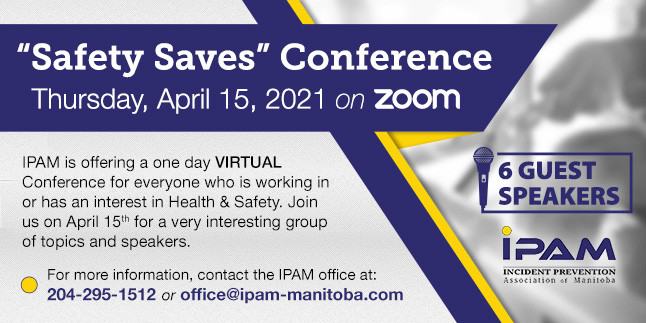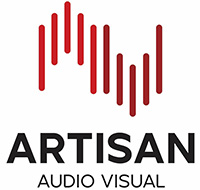IPAM ‘Virtual’ Safety Saves Conference

READY TO REGISTER! CLICK HERE
SPONSORSHIP OPPORTUNITIES!
Thank you to our sponsors…
PLATINUM SPONSOR:

PARTNER SPONSOR:

CONTRIBUTING SPONSOR:

This event contains 6 technical hours and may be eligible
for BCRSP CPD points. See the BCRSP website
at www.bcrsp.ca for CPD point criteria.
______________________________________________________________
About the Topics and Speakers:
9:00 – 10:15 am
Building Evacuation in Health Care
Speaker: Dean Campbell, CRSP – Bio
The presentation will discuss building evacuation with a focus on evacuation in Healthcare facilities as Healthcare buildings operate differently from most other buildings. Evacuation measures begin with the design of the building and a good fire plan so building occupants can quickly get out when the fire alarm sounds. For most buildings that is all that is required however in Healthcare facilities patients are for the most part unable to self – evacuate so a number of different protocols will be discussed. Lastly the presentation will look at the future of evacuation and some of the Building Code changes that are shaping the future of evacuation strategies.
10:15-10:30 am – Break
10:30-11:45 am
Help Your Brain Age Younger
Speaker: Dr. Lori Halvorson – Bio
Did you know that doing nothing about hearing loss can increase your risk for dementia? Research by Dr. Frank Lin at Johns Hopkins revealed, even a mild hearing loss, left untreated can double the risk for dementia, a moderate loss can triple the risk, and a severe hearing loss, left untreated, can put you at five times more risk for dementia. We hear with our brain, not our ears. Our ears are only sensors to pick up sound and send it to our brain for processing. We are born with 31,000 neural hair cells for our brain to recognize sounds and understand speech. Loud noise exposure, change in blood flow, ototoxic drugs, and aging can permanently damage or kill some of these hearing hairs cells, making it harder for the brain to process sound. The brain is then put under stress. Hearing loss can be very exhausting, leaving you feeling fatigued.
11:45-12:15 pm – Lunch Break
12:15-1:30 pm
Building Psychological Safety into Your Workplace Culture
Speaker: Geoff Thompson – Bio
A workplace culture that promotes psychological safety is the bedrock of every successful, sustainable MSI prevention program. Senior leaders must strive to create “no-blame” work environments that make it safe for workers to report injuries and near misses without fear of retribution. Research shows that psychologically safe workplaces appear at first to have increased rates of injury, but that’s actually a positive outcome especially when failures are deliberately re-framed as optimal learning opportunities free from personalized bias and assumptions. Join us today as we touch on tips and strategies leaders can use to start down this high road of achieving a truly fearless workplace.
1:30-1:45 pm – Break
1:45-3:00 pm
Creating a Culture of Consent in the Workplace
Speakers:
Richard McCrae – Bio
Lauren Barbara Berkley – Bio
Workplace sexual harassment is a harmful pattern of behaviour that negatively impacts individual staff as well as larger workplace units and teams. This overview presentation will focus on how the longer training will help your workplace develop a language of consent that encourages respect and understanding in the workplace, encourage supportive approaches toward staff who have disclosed their experiences of sexual harassment in the workplace, and highlight effective by-stander skills for intervention
The full workshop is ideal for all sectors, including private, corporate and business, and will be adapted for each unique workplace.
3:00-3:15 pm – Break
3:15-4:30 pm
Overview of NIOSH Respirator Approval Program
Speaker: Jeffrey Peterson – Bio
The National Institute for Occupational Safety and Health (NIOSH) National Personal Protective Technology Laboratory (NPPTL) certifies conformance of respirators in the United States to requirements codified in federal regulations. Title 42, Code of Federal Regulations, Part 84 (42 CFR 84) includes requirements for atmosphere-supplying and air-purifying respirators. NIOSH NPPTL uses established Standard Operating Procedures, policies, guidance documents such as the Standard Application Procedures (SAP) and Standard Test Procedures to ensure NIOSH-approved respirators meet the minimum requirements described in 42 CFR 84. This presentation will provide an overview of the NIOSH Respirator Approval Program, including an update about recent activities:
- Assessing conformance of N95 filtering facepiece respirators for use in healthcare settings in accordance with the Memorandum of Understanding (MOU) between NIOSH and U.S. Food and Drug Administration
- Implementing the NIOSH bivariate anthropometric panel
- Updating policies to recognize National Fire Protection Association (NFPA) 1986 Standard on Respiratory Protection Equipment for Tactical and Technical Operations
- Supporting other priority NIOSH NPPTL standard development initiative
For more information, contact Lise at 204-295-1512 or email office@ipam-manitoba.com




